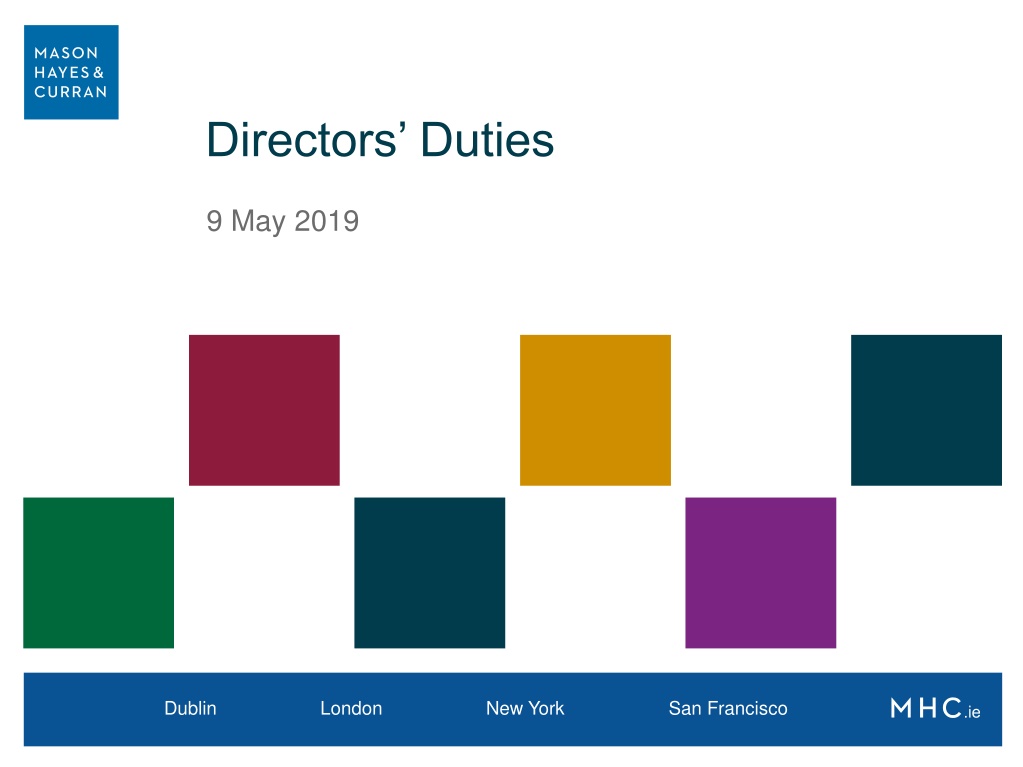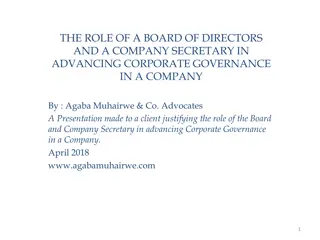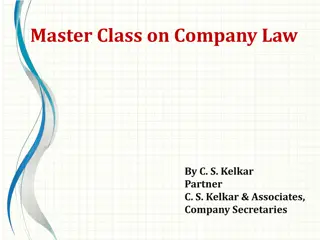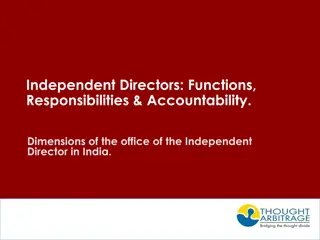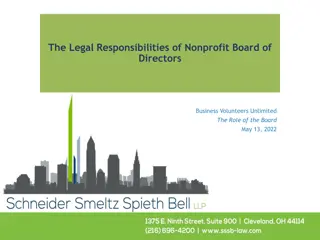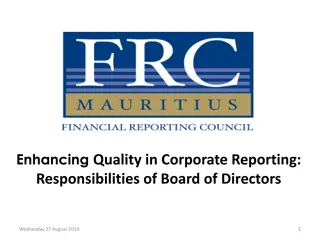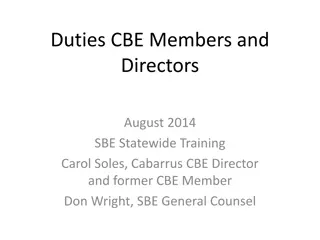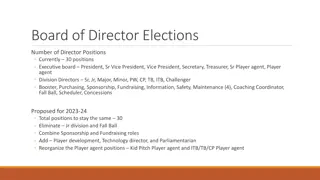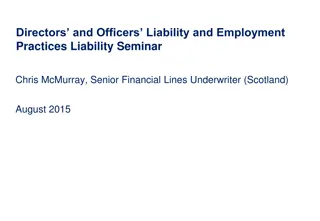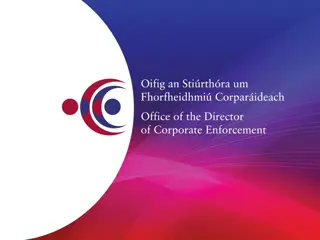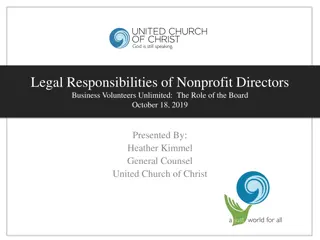Understanding Directors' Duties and Responsibilities in Corporate Governance
This presentation explores the statutory duties of directors under the Companies Act 2014 and Irish common law, emphasizing best practices for fulfilling these responsibilities. It covers the role of directors as trustees of company assets, management delegation, and the authority of directors to bind the company. Delegating authority within the board and considerations for effective delegation are also discussed.
Download Presentation

Please find below an Image/Link to download the presentation.
The content on the website is provided AS IS for your information and personal use only. It may not be sold, licensed, or shared on other websites without obtaining consent from the author. Download presentation by click this link. If you encounter any issues during the download, it is possible that the publisher has removed the file from their server.
E N D
Presentation Transcript
Directors Duties 9 May 2019 Dublin London New York San Francisco Dublin London New York San Franscisco
Introduction Purpose of this presentation Directors are responsible for ensuring that they, their company and that company s staff comply with a wide variety of legislation, including legislation concerning insolvency, anti- corruption, employment, health & safety, protection of the environment, data protection and tax. Today we will consider: 1. a director s statutory duties under the Companies Act 2014 and Irish common law; and 2. best practice in terms of the behaviour of directors when fulfilling those duties. Dublin London New York San Francisco Dublin London New York San Franscisco
The role of director Members delegate management of the company to the directors. Directors manage the company in the interests of the members. Directors can in turn delegate tasks (e.g. to company employees). Directors have responsibilities under: law; the company s constitution; internal policies. Directors are the trustees or minders of the company s assets and their duties reflect this position of responsibility. Dublin London New York San Francisco Dublin London New York San Franscisco
Management of a company Directors deemed authority Directors are responsible for the management of the business of the company, subject to the company s constitution and any direction made by special resolution of the members. Directors are authorised to bind the company. A director should not act to bind the company on his own without the authority of the board as a whole either specifically or generally. A third party may take a director as having ostensible authority to bind the company, even if that director has no actual authority to do so. Dublin London New York San Francisco Dublin London New York San Franscisco
Management of a company Delegation of authority The board of directors of a company may delegate their powers. The board should review the constitution of the company before delegating. There are a number of ways to delegate authority including: appointment of board committees; approving an authorised person to act in specified circumstances; appointing an attorney under the terms of a power of attorney; or appointing a registered person. Dublin London New York San Francisco Dublin London New York San Franscisco
Management of a company Delegation of authority Each form of delegation comes with different considerations for the board. The terms of delegation must be clearly defined as these will dictate the extent of powers delegated. (N.B. registered person). Delegation of authority, not of duties or responsibility. Dublin London New York San Francisco Dublin London New York San Franscisco
Management of a company Board meetings Notice: must be reasonable Board pack: should be issued well in advance of the board meeting to allow sufficient time to review the documents Quorum: any resolutions passed at an inquorate meeting are void constitution Resolutions: directors determine issues arising at a meeting by way of majority votes. In the event of an equality of votes, the chairman may have a second or casting vote Written resolutions: directors may pass resolution in writing signed by all the directors of the company* Virtual meetings: directors may hold board meetings by video, telephone or other electronic means provided all participants can hear and speak to each other* * There are tax considerations where directors conduct the business of the company by way of resolution passed in writing or at a virtual meeting. Dublin London New York San Francisco Dublin London New York San Franscisco
Management of a company Minutes of board meetings Legal requirement: all appointments of officers, the names of directors present at each meeting and all resolutions and proceedings Best practice: time and date, place of the meeting, record of the names of the members present and in attendance and the name of the director taking the chair Best practice: accurate, clear and unambiguous, well structured, concise, record the essential elements of the discussion on each item, avoid expressions of opinion Amendment: board minutes that have been signed by the chairperson can only be amended by resolution of the board Form: can be retained in hard or soft copy once they are capable of being produced for inspection Dublin London New York San Francisco Dublin London New York San Franscisco
Management of a company Execution of documents Deeds Required for certain types of documents (e.g. conveyance of land, mortgages, contracts where no consideration is given) Require the affixing of the common seal Company s constitution should be checked for signing authority Powers of attorney Not required to be executed as a deed Dublin London New York San Francisco Dublin London New York San Franscisco
Directors duties Directors owe duties to the company and to the company alone, but must have regard to the interests of: shareholders creditors (in certain circumstances); and employees. The company is a separate legal entity from its shareholders, and the best interests of the company will not necessarily be the same as those of the shareholders. Directors are required to remain impartial where there are different groups of shareholders and are required to ensure that their actions are not oppressive to any shareholder or group of shareholders. Dublin London New York San Francisco Dublin London New York San Franscisco
Directors duties Where the duties are found Common law: replaced by statutory duties, but the Companies Act requires that regard be had to the corresponding common law rules . Statute: the Companies Act 2014 codified the old common law duties. Constitution: a company s constitution can impose extra duties on directors and it is a statutory duty of a director to act in accordance with the company s constitution. Dublin London New York San Francisco Dublin London New York San Franscisco
Directors duties Codified duties in the Companies Act 2014 Duty to act in good faith; Duty to act honestly and reasonably Duty to act in accordance with the constitution and law; Duty not to use company property, information or opportunities for own benefit; Duty to exercise independent judgement; Duty to avoid conflicts of interests; Duty to exercise care, skill and diligence; and Duty to have regard to the interests of the company s members. Dublin London New York San Francisco Dublin London New York San Franscisco
Directors statutory duties Other duties under the Companies Act Directors of a company have a general duty to ensure compliance by the company with the Companies Act 2014. These duties include: - Duty to maintain proper books of account - Duty to prepare and approve annual accounts - Duty to have an annual audit performed (unless exempt) - Duty to maintain certain registers and other documents* - Duty to file certain documents with the Registrar of Companies* recent CRO policy of prosecuting companies and their directors for late filings of annual returns and accounts - Duty to convene general meetings of shareholders*; and - Duty to comply with company law rules on dealings between companies and their directors (e.g. loans to directors). Certain duties (marked *) are often delegated to the company secretary. Dublin London New York San Francisco Dublin London New York San Franscisco
Directors liability Civil liability A director can incur civil liability where they breach their duties. Where a director is in breach, the company may sue them for damages, seek an indemnity for losses or seek an account for profits. The remedy for breach only extends to a director being made personally liable for the company s debts in particular situations, including failure to keep adequate accounting records, trading recklessly and trading fraudulently. Dublin London New York San Francisco Dublin London New York San Franscisco
Directors liability Criminal liability Directors can have criminal liability in their capacity as director in two distinct circumstances: 1. where the director s company commits an offence under the Act and the director is found to be an officer in default ; and 2. where the director s company commits an offence under another statute and it is shown that the offence was committed with the connivance of or attributable to any neglect on the part of the director. Dublin London New York San Francisco Dublin London New York San Franscisco
Directors liability Companies Act 2014 A director who is in default is any officer who: authorises the default or, in breach of his or her duty, permits the default. Where it is proved that the director in default was aware of the basic facts of the matter, it shall be presumed, that they permitted the default. If a company contravenes certain provisions the company and any officer of it who is in default shall be guilty of offence. Auditors have a statutory duty to report Category 1 and 2 offences to the Office of Director of Corporate Enforcement Dublin London New York San Francisco Dublin London New York San Franscisco
Directors liability Classification of offences Securities law offences: Market abuse, prospectus, transparency Category 1 False accounting, fraudulent trading Category 2 - General Financial assistance, loans etc to directors Unlawful acquisition of own shares, unlawful offering of securities Personation of shareholder, unlawfully acting as director Dishonest dealings before a company becomes insolvent or goes into liquidation Category 2 false information Generally In dealings with DCE, Courts, mergers, divisions Category 2 Accounting and dealings with auditors Failure to keep adequate accounting records Denying access to and failure to retain accounting records Non-compliance requirements as to contents of annual financial statements Failure to communicate with and make full disclosure to auditors Category 3 Shares not being paid up Non-filing of annual returns, documents relating to issued share capital and insolvency Not having AGM, selective sending of proxies Trading under misleading name, without trading certificate Category 4 Failure to make routine filings Dublin London New York San Francisco Dublin London New York San Franscisco
Directors liability Classification of Companies Act offences Dublin London New York San Francisco Dublin London New York San Franscisco
Directors liability Defences Generally: .the officer in question shows that he or she took all reasonable steps to prevent the default in question or that, by reason of the circumstances beyond his or her control, was unable to do so. Accounting Offences: In any proceedings against a person in respect of an accounting offence, it shall be a defence to prove that the defendant had reasonable grounds for believing and did believe that a competent and reliable person was charged with the duty of ensuring that the provisions of the relevant subsection[s] concerned were complied with, and the latter person was in a position to discharge that duty; and the director monitored the competent and reliable person, by means of reasonable methods, properly used. Dublin London New York San Francisco Dublin London New York San Franscisco
Directors liability Offences under other legislation Anti-corruption legislation Health and safety legislation Competition legislation Data protection legislation Theft and fraud offences Tax legislation Pensions legislation Environmental legislation In general terms, where a company is guilty of an offence under this legislation, the offence can extend to that company s directors and employees where it is shown that the offence was committed with the connivance of or attributable to any neglect on the part of the director. Dublin London New York San Francisco Dublin London New York San Franscisco
Questions? Dublin London New York San Francisco Dublin London New York San Franscisco
Case study 1 You are a board member of XYZ Limited (Company) which has five directors. The constitution of the Company specifies that the quorum for a board meeting is three directors. The company secretary emails the entire board one morning to explain that the Company is entering into a lease in relation to new office space and that the lease document is required to be executed under the common seal of the Company. He explains that the matter is urgent as the landlord is pushing to complete the transaction as soon as possible and has threatened to offer the premises to another interested party if not completed by the Company that day. He proposed a board meeting for later that day. You confirm your availability to attend the board meeting if it can be held by conference call as you are out of the office for the day. Dublin London New York San Francisco Dublin London New York San Franscisco
Case study 1 (continued) Two of the other directors also confirm their availability and the secretary advises that the meeting will be held with a quorum of three later that afternoon. He circulates dial-in details to facilitate attendance by conference call along with a draft of the lease to be approved. The remaining two directors do not respond to the correspondence. You dial into the beginning of the meeting however, during the course of the meeting you lose contact with the meeting as the network coverage in your location is poor. By the time you dial back into the meeting the call has completed. The company secretary confirms by email to all directors that the lease has been approved and will be executed by the two directors who were present at the meeting and sealed. One of the directors who was not present at the meeting replies to this email advising that she was in the United States at a conference and had only received the initial email after the time scheduled for the meeting. She expresses a concern that the rent being paid under the lease was much higher than market rent in the area however she confirms that she would be happy to approve it if all of the other board members are satisfied with the terms. Dublin London New York San Francisco Dublin London New York San Franscisco
Case study 1 (continued) Questions to consider: Was sufficient notice of the board meeting given? Was there a quorum present for the board meeting? Was the lease validly approved prior to its execution? If the meeting is found to be invalidly held, what are the options for the board in relation to the lease which was subsequently signed and sealed? What would you suggest to improve the process? Dublin London New York San Francisco Dublin London New York San Franscisco
Case study 2 You are a member of the board of directors of Food Ireland Limited (Company). The Company is about to complete the purchase of a new company, Drink Ireland Limited (Target). Completion of the purchase of the Target will take place in Ireland but you are the only director that will be available in Ireland to execute the completion documents. A number of the completion documents are deeds and require the affixation of the Company seal and the signature of two officers of the Company. Question to consider: What options are available to the directors to ensure that the documents are executed correctly and delivered for Completion? Dublin London New York San Francisco Dublin London New York San Franscisco
Case study 3 On 1 January 2018, the board of directors of Food Ireland Limited (Company) approved a new health and safety policy for the Company. The parent company, Food USA Inc., instructed the Company that this was a new global policy which must be adopted as the number of employees injuring themselves at work was rising. Two directors dialled in from San Francisco where they reside. Another director is resident in Ireland and was appointed chairperson. One alternate director also attended. Quorum for any board meeting of the Company is 4 directors. The Company has a policy that all global policies must be reviewed from an Irish law perspective to ensure compliance with local law. One of the directors suggested the board waive this review so the policy could be adopted straight away in an effort to limit the number of employee related incidents occurring. Dublin London New York San Francisco Dublin London New York San Franscisco
Case study 3 (continued) All four directors present approved the health and safety policy unanimously and resolved this should adopted by the Company. It was resolved that the HR department should communicate the policy to all staff. On 1 April 2018 the HR department was given a copy of the new policy to implement across the 15 shops of the Company. The new policy was uploaded to the Company s intranet. An email was sent to employees telling them there was a new health and safety policy. Only office staff and management have access to the Company s intranet and email. Dublin London New York San Francisco Dublin London New York San Franscisco
Case study 3 (continued) Questions to consider: Where was the meeting held? What is the role of the Food USA Inc? Was the policy correctly adopted by the Company? Was the policy implemented? Have the directors fulfilled their duties? What other approaches could the board have taken? Dublin London New York San Francisco Dublin London New York San Franscisco
Case study 4 At the last AGM of Drink Ireland Limited (Company) it was resolved to appoint new auditors. The new auditors, Vigilant & Co, are close to finalising the audit of the financial statements of the Company for the financial year ending 31 December 2018. During the course of this audit, Vigilant & Co formed the view that the manner in which a finance lease to which the Company was a party had been accounted for during the financial years ending 31 December 2015 and 31 December 2016 was incorrect, such that the liabilities of the Company had been understated in the statutory financial statements of the Company as approved by the board, presented to the members of the Company and filed in the CRO for those periods. The auditors have also formed the view that this misstatement is material in the context of the Company s assets and liabilities and when applying the financial reporting standards adopted by the Company. Dublin London New York San Francisco Dublin London New York San Franscisco
Case study 4 (continued) The auditors have advised the board of directors of the company that, in their view, this misstatement means that the statutory financial statements of the company for financial years ending 31 December 2015 and 2016 did not give a true and fair view of the assets and liabilities of the company. Questions to be considered: What does this mean for the directors of the Company? What can be done by the directors of the Company? Have the auditors any reporting obligations in respect of the Company? Dublin London New York San Francisco Dublin London New York San Franscisco
Directors duties Dublin London New York San Francisco Dublin London New York San Franscisco
